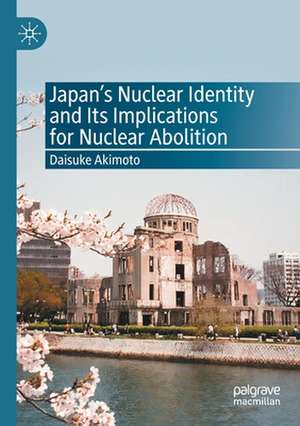Japan’s Nuclear Identity and Its Implications for Nuclear Abolition
Autor Daisuke Akimotoen Limba Engleză Paperback – 28 mai 2021
| Toate formatele și edițiile | Preț | Express |
|---|---|---|
| Paperback (1) | 634.82 lei 6-8 săpt. | |
| Springer Nature Singapore – 28 mai 2021 | 634.82 lei 6-8 săpt. | |
| Hardback (1) | 640.06 lei 6-8 săpt. | |
| Springer Nature Singapore – 27 mai 2020 | 640.06 lei 6-8 săpt. |
Preț: 634.82 lei
Preț vechi: 746.84 lei
-15% Nou
Puncte Express: 952
Preț estimativ în valută:
121.47€ • 127.17$ • 100.51£
121.47€ • 127.17$ • 100.51£
Carte tipărită la comandă
Livrare economică 05-19 aprilie
Preluare comenzi: 021 569.72.76
Specificații
ISBN-13: 9789811535468
ISBN-10: 9811535469
Pagini: 198
Ilustrații: XV, 198 p. 1 illus.
Dimensiuni: 148 x 210 mm
Greutate: 0.26 kg
Ediția:1st ed. 2020
Editura: Springer Nature Singapore
Colecția Palgrave Macmillan
Locul publicării:Singapore, Singapore
ISBN-10: 9811535469
Pagini: 198
Ilustrații: XV, 198 p. 1 illus.
Dimensiuni: 148 x 210 mm
Greutate: 0.26 kg
Ediția:1st ed. 2020
Editura: Springer Nature Singapore
Colecția Palgrave Macmillan
Locul publicării:Singapore, Singapore
Cuprins
1. Introduction: The Paradox of Japan’s Nuclear Identity.- 2. Japan as a ‘Nuclear-Bombed State’: The Genocidal Nature of Nuclear Violence.- 3. Japan as a ‘Nuclear Disarmament State’: Its Global Initiative for Nuclear Abolition.- 4. Japan as a ‘Nuclear-Threatened State’: Facing the Nuclear Threat of North Korea.- 5. Japan as a ‘Nuclear Umbrella State’: Embedded in the US Nuclear Strategy.- 6. Japan and the Treaty on the Prohibition of Nuclear Weapons (TPNW).- 7. The Future of Japan’s Nuclear Disarmament Diplomacy.
Notă biografică
Daisuke Akimoto is Official Secretary in the House of Representatives, Japan, and former Assistant Professor at the Soka University Peace Research Institute, Japan.
Textul de pe ultima copertă
“Daisuke Akimoto’s impressive command of diverse nuclear arms negotiations reflects his personal commitment to building a world made secure by achieving peace with justice.”
—Stuart Rees, Professor Emeritus, University of Sydney
"This is a book that needs to be read by anyone interested in understanding what drives these ambivalent and inconsistent positions. I heartily recommend it to scholars and practitioners who wish to build a more peaceful Japan in a world of nuclear threat and imminent catastrophe." —Kevin Clements, Professor, University of Otago, New Zealand
"Japan's relationship with nuclear weapons is complex… Dr. Akimoto provides readers with a detailed explanation of this relationship and will help us better understand this important topic."
—Robert Dujarric, Director, Institute of Contemporary Asian Studies, Temple University, Japan Campus.
This book examines Japan’s nuclear identity and its implications for abolition of nuclear weapons. By applying analytical eclecticism in combination with international relations theory, this book categorizes Japan’s nuclear identity as a ‘nuclear-bombed state’, ‘nuclear disarmament state’, ‘nuclear-threatened state’, and a ‘nuclear umbrella state’. This research investigates whether the bombings of Hiroshima and Nagasaki were ‘genocide’ or not, to what degree Japan has contributed to nuclear disarmament, how Japan has been threatened by ballistic missiles and nuclear weapons of North Korea, and how Japan’s security policy has been embedded with the nuclear strategy of the United States. It also sheds light on theoretical factors that Japan does not support the Treaty on Prohibition of Nuclear Weapons. Finally, this book considers the future of Japan’s nuclear identity and attempts to explore alternatives for Japan’s nuclear disarmament diplomacy toward a world without nuclear weapons.
Daisuke Akimoto is Official Secretary in the House of Representatives, Japan, and former Assistant Professor at the Soka University Peace Research Institute.
—Stuart Rees, Professor Emeritus, University of Sydney
"This is a book that needs to be read by anyone interested in understanding what drives these ambivalent and inconsistent positions. I heartily recommend it to scholars and practitioners who wish to build a more peaceful Japan in a world of nuclear threat and imminent catastrophe." —Kevin Clements, Professor, University of Otago, New Zealand
"Japan's relationship with nuclear weapons is complex… Dr. Akimoto provides readers with a detailed explanation of this relationship and will help us better understand this important topic."
—Robert Dujarric, Director, Institute of Contemporary Asian Studies, Temple University, Japan Campus.
This book examines Japan’s nuclear identity and its implications for abolition of nuclear weapons. By applying analytical eclecticism in combination with international relations theory, this book categorizes Japan’s nuclear identity as a ‘nuclear-bombed state’, ‘nuclear disarmament state’, ‘nuclear-threatened state’, and a ‘nuclear umbrella state’. This research investigates whether the bombings of Hiroshima and Nagasaki were ‘genocide’ or not, to what degree Japan has contributed to nuclear disarmament, how Japan has been threatened by ballistic missiles and nuclear weapons of North Korea, and how Japan’s security policy has been embedded with the nuclear strategy of the United States. It also sheds light on theoretical factors that Japan does not support the Treaty on Prohibition of Nuclear Weapons. Finally, this book considers the future of Japan’s nuclear identity and attempts to explore alternatives for Japan’s nuclear disarmament diplomacy toward a world without nuclear weapons.
Daisuke Akimoto is Official Secretary in the House of Representatives, Japan, and former Assistant Professor at the Soka University Peace Research Institute.
Caracteristici
Explores Japan's nuclear policies in an age of rising tensions Unpacks how Japan's 'post-nuclear identity' shapes policymaking and self-perception Foregrounds debates about changes to the Japanese constitution in history
